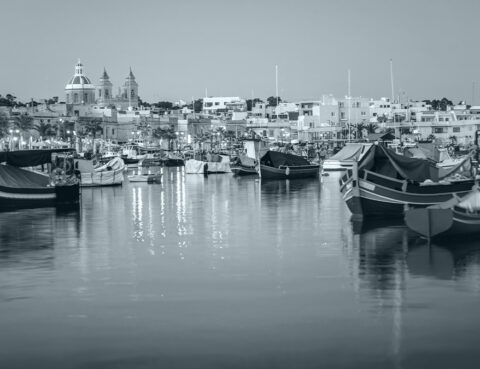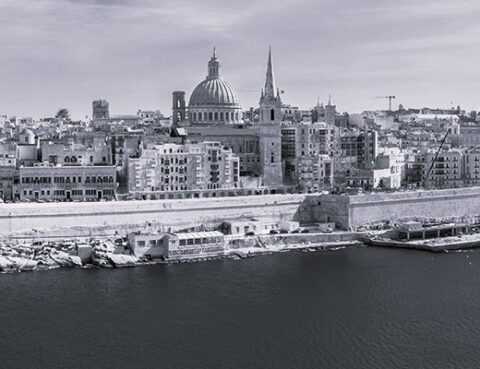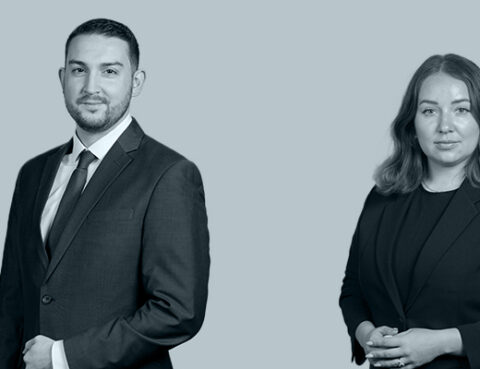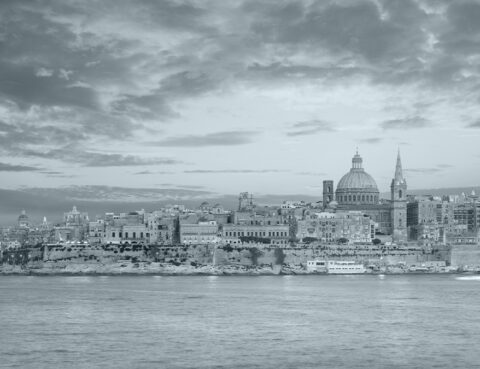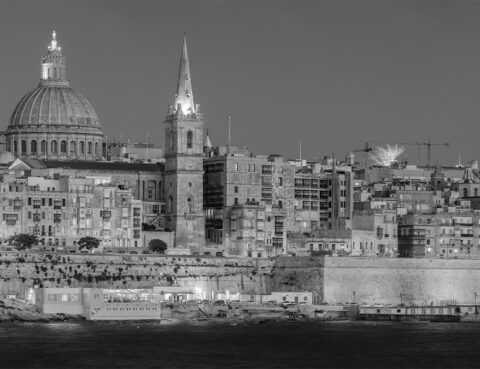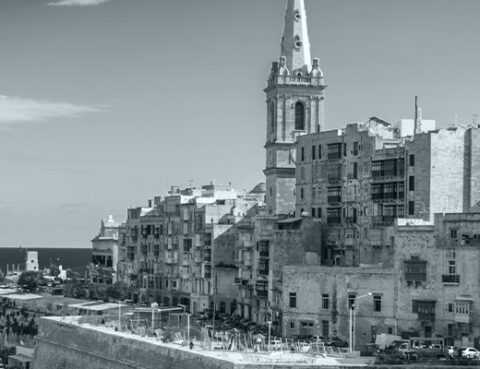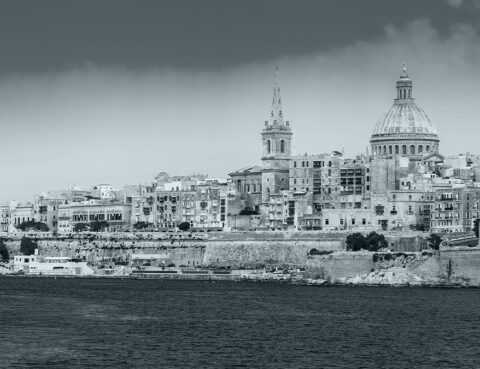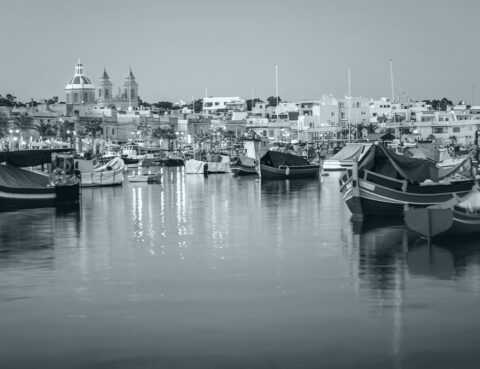The sunny Mediterranean island of Malta, with its stunning landscapes and vibrant culture, has become an attractive destination for UK citizens looking to start a new chapter in life. Whether for work, retirement, tax considerations or a better climate, moving to Malta from the UK offers a wealth of opportunities.
Immigrating to Malta from the UK: A Complete Guide
Since Brexit, UK citizens are no longer EU nationals, which means different rules now apply to them when moving to Malta. This article covers the key aspects UK citizens should know about Malta’s visa, residency, and citizenship options.
Why Moving to Malta from the UK?
- Quality of Life: Malta boasts a high standard of living, excellent healthcare and a reputable education system. The island is known for its friendly locals and vibrant expat community, making it easy to adapt.
- Strategic Location: Positioned in the heart of the Mediterranean, Malta serves as a gateway to Europe, North Africa, and the Middle East, enhancing travel and business opportunities.
- Language: English is one of the official languages in Malta, making communication straightforward for UK citizens relocating to Malta.
- Mild Mediterranean Climate: Malta’s warm Mediterranean climate, with long summers and mild winters, is a major draw for those looking to escape the colder UK weather. The island offers a relaxed outdoor lifestyle with numerous beaches, historical sites, and cultural events to enjoy throughout the year.
- Stable Economy and Safe Environment: Malta enjoys a stable economy with a growing financial services and technology sector, making it a good destination for professionals seeking new opportunities. Additionally, Malta is known for its low crime rates, providing a safe and secure environment for families.
- Favourable Tax Regime: Malta’s tax system is highly appealing, particularly for individuals with foreign-sourced income. Non-domiciled residents can benefit from a 15% flat tax rate on foreign income remitted to Malta under the Global Residence Programme, with no tax on income not remitted to the island. This is a significant advantage for retirees, investors, and expatriates with overseas earnings.
Malta Visa Requirements for UK residents and BRP Holders
UK citizens can enter Malta without a visa for short stays of up to 90 days within a 180-day period under the Schengen Zone rules. However, for long-term relocation, applying for a residence permit may be required based on the individual’s circumstances.
Before travelling to Malta one requires:
- Valid Passport: A passport which is valid for at least three months beyond the planned departure date from Malta.
- Travel Insurance: A comprehensive travel insurance policy is highly recommended to cover potential medical emergencies or trip cancellations.
- Return Ticket: Show proof of onward or return travel, as well as accommodation details.
British passport holders
Post-Brexit, UK passport holders no longer have the automatic right to live and work in Malta. If you plan to stay beyond the 90-day visa-free period, you’ll need to apply for the appropriate residency permit.
BRP holders (Biometric Residence Permit)
If you’re a UK resident with a BRP (such as non-UK nationals or third-country nationals living in the UK), you would generally need a visa to enter Malta. The visa requirements depend on your nationality.
Malta Residency Options for UK Citizens
UK citizens have several routes to acquire residency in Malta, depending on their objectives and whether they wish to work, retire, apply for a special tax status, obtain permanent residency or simply enjoy an extended stay on the island. The primary residency options include:
Malta Permanent Residence Programme (MPRP) for UK citizens
UK citizens can apply for permanent residency under the Malta Permanent Residency Programme (MPRP) if they can demonstrate they are in possession of at least €500,000/650,000 in capital, satisfy specific background checks and meet the health insurance requirements. Once approved, applicants are required to buy or rent property in Malta, give a small donation to charity and pay a government fee.
MPRP Requirements for UK citizens – updated with latest 2025 amendments
Buy a property in Malta or Gozo and spend at least €375,000
OR
Rent a property in Malta or Gozo and spend at least €14,000 per annum
AND
Pay a non-refundable contribution of €37,000 together with a government admin fee of €60,000.
An additional government admin fee payment of €7,500 for each adult dependant child, parent and grand parents is also due.
AND
Donate at least €2,000 per family to a charity in Malta.
Global Residence Programme (GRP)
The Global Residence Programme is a special tax programme whereby applicants are subject to tax in Malta at a flat rate of 15% on any foreign income remitted to Malta and a flat rate of 35% on any locally generated income. UK nationals applying for the GRP are required to annually declare that they didn’t spend more than 183 days in a calendar year, in any other one jurisdiction.
GRP Requirements for UK citizens
Buy a property in the South of Malta or Gozo and spend at least €220,000 or spend €275,000 in the North/Central Malta.
OR
Rent a property in the South of Malta or Gozo and spend at least €8,750 per annum or €9,600 if the property is chosen in the North/Central Malta.
AND
Pay a non-refundable administrative fee of €6,000
AND
Pay an annual minimum tax of €15,000
Malta Work Permit for UK citizens
If you have a job offer in Malta, you will need to apply for a work permit. Your employer typically assists with this process, which involves applying for a Single Permit that combines both work and residence permits.
Malta Citizenship for UK Citizens
UK citizens looking for a more permanent status may consider obtaining Maltese citizenship. There are three main routes available: citizenship through naturalisation, citizenship by descent and citizenship by investment.
Malta Citizenship by Merit
For UK nationals seeking deeper integration into Maltese society, Malta offers a unique route to citizenship by merit. This pathway is designed for individuals who have made, or are positioned to make, exceptional investments / contributions to the country across a range of fields.
Citizenship by merit is granted on a discretionary basis to those who have demonstrated outstanding achievements or services in areas such as business, science, technology, culture, sport, or economic development. Unlike investment-based citizenship programmes, this route places emphasis on personal impact, long-term engagement, and meaningful contributions to Malta’s national interest.
Each application is assessed individually, and successful candidates are awarded citizenship as a mark of recognition and appreciation for their merit. For UK nationals with a strong connection to Malta and a proven track record of excellence, this pathway offers a dignified and rewarding means of becoming part of the Maltese national community.
Malta Citizenship by Naturalisation
After residing in Malta for five years, UK citizens may apply for Maltese citizenship by naturalisation. This process involves demonstrating strong ties to Malta, including integration into Maltese society. Applicants will need to meet language and residency requirements. Such applications are subject to the discretion of the Minister responsible for citizenship.
Maltese Citizenship by Descent
UK citizens who have Maltese ancestry may be eligible for Maltese citizenship by descent. This route is open to individuals who can prove that they have Maltese parents, grandparents, or even great-grandparents,
Benefits of Maltese Citizenship
Many are the advantages of Maltese Citizenship. You can find a detailed guide on the benefits of Citizenship by Direct Investment in this dedicate article.
- Travel Freedom: Maltese citizens enjoy visa-free travel across the EU and Schengen Area and also benefit from visa-free travel or visa on arrival in more than 190 countries, enhancing global mobility.
- Quality of Life: Malta offers a high standard of living, excellent healthcare, and a warm climate, making it an attractive destination for families and retirees.
- Cultural Richness: The island’s rich history and thriving community provide a unique lifestyle experience, with numerous festivals, culinary delights, and outdoor activities.
Malta offers a range of appealing options for UK citizens looking to relocate, from residency to full citizenship through naturalisation, descent or investment routes. Given the post-Brexit changes, it’s important to review the latest legal requirements and speak to a licensed Maltese Immigration lawyer to ensure the correct steps are taken.
Legal Notice 159 of 2025 introduces the Granting of Citizenship by Naturalisation on the Basis of Merit Regulations. This new regulation offers a structured and merit-based path to acquiring Maltese citizenship for individuals who have rendered, or intend to render, exceptional services or contributions to Malta or humanity, or who are considered of exceptional interest to the Republic of Malta.
Applications under these regulations are administered by the Community Malta Agency (AKM), which is responsible for receiving and processing applications, conducting due diligence, and coordinating the work of the Evaluation Board appointed by the Minister responsible for citizenship.
Eligibility for Citizenship by Merit
Applicants must:
- Render or intend to render an exceptional service or contribution to Malta or humanity, or be of exceptional interest to the Republic of Malta.
Family members that may be included:
- Spouse or partner in a monogamous marriage or equivalent relationship.
- Children under 18, including adopted children.
- Unmarried, financially dependent children aged 18 to 28.
Applicants are disqualified if they or their dependants have been refused a visa to a country with which Malta has visa-free travel, unless the refusal was not based on public policy, security, or health concerns.
Overview of the Citizenship by Merit Application Process
1- Submission of Proposal Letter
The process begins with the submission of a detailed Proposal Letter to the Community Malta Agency. This document must include:
- An introduction and overview of the applicant’s background and accomplishments.
- A description of the exceptional contribution or service the applicant intends to make.
- A detailed plan on how the applicant intends to continue contributing to Malta following naturalisation
The Agency will carry out an initial due diligence review and request the payment of non-refundable administrative fees before referring the proposal to the Evaluation Board.
2- Evaluation of the Proposal
An independent Evaluation Board, composed of a legally qualified chairperson and two subject matter experts, assesses the proposal. The Board may:
- Request further documentation.
- Interview the applicant’s representatives or other relevant parties.
The Board then submits its recommendation to the Minister via the Agency. If the proposal is approved, the applicant is issued a Letter of Approval in Principle.
3- Application for Naturalisation
Once the Letter of Approval in Principle is issued, the applicant may submit a full citizenship application. This must include:
- Proof of residence in Malta for at least 8 months preceding the application.
- Title to adequate residential property (leased or owned).
- Evidence of the contribution or service rendered or planned.
- Proof of language proficiency in English or Maltese.
A second round of due diligence is conducted. The completed application is reviewed again by the Evaluation Board, which provides its recommendation to the Minister. If approved, the Letter of Approval is issued.
Naturalisation, Oath and Ongoing Commitments
Following the Letter of Approval:
- The applicant must take the Oath of Allegiance within six months (extendable in exceptional cases).
- Prior to the oath, the applicant must sign a written undertaking to continue fulfilling obligations and commitments.
- The Agency is empowered to monitor compliance and may require supporting documentation.
Revocation of Citizenship
Citizenship may be revoked by the Minister if:
- The applicant fails to honour the commitments or obligations outlined in the application.
- The citizenship was obtained through false representations or concealment of facts.
Our Citizenship by Merit Law Practice
At ACC Immigration, our specialised Citizenship team offers comprehensive legal and tax support for individuals pursuing Maltese citizenship whether by merit, descent, marriage or other naturalisation pathways. We guide you through every step of the process, beginning with a thorough eligibility assessment before the application is initiated. Our team supports the preparation and submission of all necessary documentation and advises on the exceptional services and contributions to be made while helping you establish meaningful connections with Malta.
ACC is proud to announce the promotion of Antoine Saliba Haig and Marina Magri to Partnership level. Their appointments reflect their expertise, leadership, and dedication to the firm’s continued growth, particularly within the Immigration and Global Mobility practice.
Antoine Saliba Haig – Partner, Global Mobility & Immigration Practice
Antoine has been a core member of the firm since 2014, specialising in Maltese citizenship and residency law. With deep academic and practical experience in investment migration, he has successfully guided clients through a range of citizenship solutions while contributing to the field through publications and international engagements.
Marina Magri – Director, Immigration & Global Mobility Practice
Marina joined the firm in 2015 and has played a vital role advising business families and executives on global mobility and residence planning. In 2024, she was appointed co-head of the immigration arm, where she leads on compliance and risk management, strengthening the practice’s global impact.
These promotions reflect ACC’s continued focus on excellence and client-centric leadership. We congratulate Antoine and Marina on this significant milestone.
The Maltese Government has announced key amendments to the Malta Permanent Residence Programme (MPRP), enacted through Legal Notice 146 of 2025, aimed at enhancing the programme’s structure, improving flexibility for applicants, and reducing costs for families.
One of the most notable changes is the introduction of a temporary residence permit for MPRP applicants. The new provision allows applicants and their families to apply for a one-year renewable permit while their application is being processed enabling them to relocate to Malta earlier in the process.
The amendment also simplifies the programme’s financial framework. The contribution requirement is now fixed at €37,000, regardless of whether the applicant chooses to purchase or rent a qualifying property.
The administration fee for the main applicant has been set at €60,000, payable in two stages: an initial €15,000 on submission of the application and €45,000 following the issuance of the Letter of Approval in Principle.
To support families, the revised rules introduce fee waivers for certain dependants, including spouses, minor children, and adult children with disabilities. In addition, parents and grandparents must now be not in full-time employment in order to qualify as dependants.
The Government has also granted the Agency the power to issue guidelines regulating the use of qualifying property during periods when beneficiaries are temporarily abroad.
The new rules will apply to all MPRP applications submitted on or after 1 January 2025, including those that remain pending when the amendments come into force.
Legal Notice 146 of 2025 reflects Malta’s ongoing commitment to maintaining a transparent and competitive residence programme that remains attractive to global investors and their families.
Our Malta Residence Practice
ACC Immigration’s specialist Malta Residence Practice offers professional, transparent, and comprehensive legal and tax advisory services related to the acquisition of residence status in Malta under regulated programmes such as the Malta Permanent Residence Programme (MPRP):
- advising on eligibility for the selected residence programme prior to submission;
- providing pre-immigration
- advice tailored to your personal and financial circumstances;
- guiding you in the preparation and compilation of all required documentation for your residence application;
- reviewing and vetting supporting documents to ensure compliance with programme regulations;
- advising on the investment requirements and assisting with the structuring and holding of qualifying investments;
- supporting you with property rental or acquisition in Malta, including review of promise of sale agreements and assistance with AIP permit applications where required
Following recent amendments to the Maltese Citizenship Act (Cap. 188 of the Laws of Malta), the Maltese Government has introduced a renewed and strengthened framework for acquiring Maltese citizenship by merit. This article addresses the most frequently asked questions about these changes and what they mean for prospective applicants.
What is Malta Citizenship by Merit?
Citizenship by merit is a legal pathway for acquiring Maltese citizenship through exceptional services or contributions to Malta or to humanity. Introduced in 2017 and now reinforced through recent legal amendments, this route recognises individuals whose talents, skills, or achievements significantly benefit Malta.
What are the recent changes introduced in 2025?
The Maltese Government amended the Citizenship Act with three main goals:
- Compliance with EU law: The previous “Citizenship for Exceptional Services” programme and its references have been removed in line with the CJEU’s ruling in Case C-181/23.
- Strengthening merit-based citizenship: The new law enhances legal provisions for granting citizenship on merit, aligned with Malta’s long-term Vision 2050 strategy.
- Reaffirming national competence: Malta maintains that granting citizenship remains a national prerogative, as confirmed by the EU Court of Justice.
Who is eligible for Malta Citizenship by Merit?
Eligible applicants include individuals who have provided, or are proposing to provide, exceptional service or contribution to Malta or humanity in fields such as:
- Science & Research
- Culture & the Arts
- Sports & Athletics
- Entrepreneurship
- Philanthropy (newly introduced)
- Technology (newly introduced)
The contribution must be manifestly superior or value-adding, and of exceptional interest to the Republic of Malta.
How is “exceptional contribution” defined?
The term refers to a clearly outstanding and beneficial impact on Malta’s national interest. Examples include job creation, internationally recognised innovation, philanthropic initiatives, or high-level achievements in one’s field that elevate Malta’s global reputation.
What is the Malta Citizenship by Merit application process?
The process begins by first acquiring residence in Malta and then submitting a formal application as follows:
- Application Submission: The request is filed with the government agency Komunità Malta.
- Due Diligence: A thorough background and integrity screening is conducted with expert support.
- Evaluation Board: The independent board assesses the application and may interview the applicant.
- Recommendation: The board provides a formal recommendation to the Minister (not merely an opinion, as previously required).
- Ministerial Decision: The Minister makes the final decision to grant citizenship.
Is there an investment or donation requirement?
No. The new framework removes any reference to investors and does not require a fixed contribution or payment. Instead, applicants must propose and demonstrate the exceptional value or service they offer to Malta.
Will due diligence still apply?
Yes. Due diligence remains a central and rigorous component of the process. The government regulator continues to play a key role, and its oversight will be further strengthened under the new framework.
Can authorities seek expert endorsement?
Yes. The evaluation board is now empowered to request an endorsement from a competent authority in the applicant’s field, to confirm the merit of the claimed contribution.
What happens to those who obtained citizenship under the old programme?
Citizenship already granted under the previous regime remains valid and unaffected. These individuals continue to be governed by the same laws and conditions under which they originally obtained citizenship.
What does the law say?
At ACC Immigration, our dedicated Citizenship team provides seamless, end-to-end legal and tax advisory services for individuals seeking to acquire Maltese citizenship through merit or other recognised routes. Our services include:
- Assessing your eligibility before initiating a citizenship application;
- Assisting in the compilation and submission of all required documentation;
The Maltese Government has today announced more details on the proposed amendments to the Maltese Citizenship Act.
At a press briefing following the motion’s tabling, Minister for Home Affairs Byron Camilleri affirmed the government’s commitment to comply with the judgment:
“We will honour the judgment of the EU and conform with its ruling. However, the Court also confirmed that the granting of citizenship remains a national competence. We will be expanding and strengthening the way in which citizenship is granted by merit.”
While the full text is not yet public, the government has made clear its intent to completely remove any transactional or monetary element from the citizenship acquisition process.
The new model will centre around genuine contributions to the Republic of Malta, focusing on individuals who will provide exceptional services or exceptional contributions in areas such as:
- Science and Research
- Innovation and Technology
- Entrepreneurship and Job Creation
- Sports, Arts and Culture
- Philanthropy and Social Impact
The proposed amendments will also formally recognise “job creation” and “technologists and philanthropists” as eligible categories, reflecting Malta’s Vision 2050 goals of driving innovation and societal development.
Crucially, the amendments will eliminate any fixed investment or contribution requirements and shift the focus entirely to merit and public value. As Minister Camilleri clarified, “There will no longer be a set amount of money which applicants must pay to acquire citizenship.”
The evaluation process under the revised framework will also become more rigorous and transparent:
- An Evaluation Board will now be required to issue a formal recommendation (not merely an opinion) to the Minister.
- Sector-specific authorities will advise the Board, and the Board will have the discretion to interview applicants directly.
- Citizenship will remain at the Minister’s discretion, but only following due process and proper sectoral vetting.
- Names of successful applicants will continue to be published, maintaining transparency.
The judgment in EC v Malta reiterated that while nationality remains a national prerogative under Article 4(2) TEU, it must be exercised in a manner consistent with EU law particularly where it impacts Union citizenship under Article 20 TFEU. The Court did not object to naturalisation by merit or exceptional service, but rather the practice of granting nationality in exchange for payment, which undermines the principle of sincere cooperation under Article 4(3) TEU.
ACC Advisors welcomes this evolution in Malta’s citizenship legislation. The shift from a transactional model to a public interest-driven framework is a long-anticipated step toward a more resilient, European-aligned citizenship strategy.
Malta has taken its first legislative step to align its citizenship framework with the recent judgment of the European Court of Justice (ECJ) in Case C-181/23 – Commission v Malta. On 30th June 2025, Home Affairs Minister Byron Camilleri tabled a bill in Parliament proposing amendments to the Maltese Citizenship Act, marking Malta’s formal response to the EU Court’s ruling in April 2025.
The bill is currently at first reading stage, and in line with standard parliamentary practice, the full text of the proposed amendments has not yet been published. Additional details will be discussed during the second and third reading before a vote is taken. Official statements and have confirmed that the purpose of the bill is to align Malta’s Citizenship framework for investors and entrepreneurs with the principles laid down by the Court.
In its judgment, the ECJ reaffirmed that while nationality remains a national competence under Article 4(2) TEU, Member States must exercise this power in compliance with EU law when it affects Union citizenship under Article 20 TFEU.
While the judgment did not prohibit naturalisation based on exceptional services, it clarified that such legislation must be designed to preserve a meaningful connection between the applicant and the Member State.
Government Response: Legislative Reform Underway
A spokesperson for the Home Affairs Ministry confirmed that Motion No. 381 represents Malta’s first step in amending its citizenship laws in line with the ECJ’s ruling:
“This marks the first reading in Parliament, paving the way for amendments that will comply with the European Union Court’s judgment in Case C-181/23, Commission v. Malta.”
In a government press release dated 29 April 2025, the authorities reiterated their respect for the rule of law, noting that Malta will “study the legal implications of this judgment so that the regulatory framework on citizenship can then be brought in line with the principles outlined in the judgment.”
What Changes Are Expected?
While the draft law has not yet been published, it is expected that the upcoming amendments will aim to:
- Uphold the integrity and value of both Maltese nationality and European Union citizenship.
These reforms aim to preserve a lawful and credible pathway to naturalisation, while fully respecting the principles set out in the EU Court’s judgment.
A Sustainable Path Forward
The forthcoming amendments are expected to reshape Malta’s citizenship offering in a way that balances national interests, EU legal obligations, and the need for a robust and sustainable legal framework.
Our Citizenship Practice
At ACC Advisors, we provide comprehensive immigration and private client advisory services for individuals and families seeking to obtain Maltese citizenship through exceptional services.
Our team offers end-to-end support, including:
- Assessing your eligibility and advising on the most suitable route to citizenship;
- Delivering immigration and tax guidance prior to relocation or application;
- Preparing and reviewing all required documentation to ensure a smooth application process;
- Managing the submission process with precision and care;
- Assisting with property acquisition or rental, including AIP permit applications (required for non-residents), reviewing contracts, and coordinating with notaries.
Our holistic approach ensures that your journey to Maltese citizenship is efficient, and aligned with your personal and financial goals. Get in touch with us today.
With the EU moving to finalise a mechanism to suspend Schengen visa-free travel for Caribbean countries offering citizenship by investment, interest is shifting towards more secure alternatives within Europe. Residency by investment programmes are gaining ground as strategic options, offering residence rights in the EU without losing Schengen access. Among these, Malta’s Permanent Residence Programme (MPRP) stands out for its stability, transparency, and long-term benefits.
From Caribbean to Europe: A Shift in Global Mobility Strategy
The global investment migration landscape is shifting rapidly, since Caribbean citizenship by investment (CBI) programmes are under increasing scrutiny. This has been especially true following recent decisions by the European Union, the United Kingdom, and the United States to tighten their approach to visa waivers for countries offering citizenship with minimal genuine ties.
Meanwhile, the United States issued a travel ban memorandum naming Antigua and Barbuda, Dominica, St. Kitts and Nevis, and St. Lucia, citing concerns over citizenship grants without residency or genuine connection.
As the viability of Caribbean citizenship by investment programmes comes under increasing pressure, European residency by investment regulations, are gaining prominence as lawful and strategically sound alternatives. While the Schengen Area currently remains accessible to Caribbean passport holders, the situation may change with the European Union’s announcement of legislative reforms to tighten its visa policy.
EU Reform: The Updated Visa Suspension Mechanism
In April 2025, the European Council and Parliament reached a provisional agreement to revise the EU’s visa suspension mechanism. Originally introduced in 2013, the regulation allows the EU to suspend visa-free travel from third countries under specific conditions.
The updated regulation introduces broader grounds for suspension. Chief among them is the operation of investor citizenship schemes that offer nationality without genuine links or long-term commitments. The EU now has greater authority to suspend visa-free access for countries running such programmes, with initial suspensions lasting up to 12 months and potential extensions reaching 24 months.
Additional triggers include:
- Divergence in visa policy from EU standards;
- Weaknesses in document security and hybrid threats;
- Increased asylum claims or overstay rates;
- Deterioration in human rights or rule of law.
The Schengen Area: Europe’s Passport-Free Zone
The Schengen Area includes 29 European countries that have eliminated internal border controls, allowing passport-free movement for residents and eligible visa holders. Malta, a full Schengen member, grants visa-free access to residents under the MPRP for up to 90 days within any 180-day period across the entire zone.
As of 2025, Schengen includes Austria, Belgium, Bulgaria, Croatia, Cyprus, Czech Republic, Denmark, Estonia, Finland, France, Germany, Greece, Hungary, Iceland, Italy, Latvia, Liechtenstein, Lithuania, Luxembourg, Malta, Netherlands, Norway, Poland, Portugal, Romania, Slovakia, Slovenia, Spain, and Sweden.
Malta’s MPRP: A Secure Route to European Residency
Unlike Caribbean citizenship programmes, Malta’s Permanent Residence Programme grants residence in a Schengen Member State. As a result, beneficiaries gain the right to reside in Malta indefinitely and can travel visa-free within the Schengen Area using their Maltese residence card.
Malta has built a reputation for political and economic stability, a sound legal system, and a strong compliance culture. The country actively participates in EU and OECD anti-money laundering and financial transparency frameworks.
Key Requirements of the MPRP
To qualify for the MPRP, applicants must meet several legal, financial, and due diligence obligations:
- Government Contribution: €110,000 if leasing a qualifying property, or €80,000 if purchasing.
- Property Requirement: Minimum annual rent of €14,000 or minimum purchase price of €375,000. The property must be retained for at least five years, and a qualifying property must always be maintained.
- Philanthropic Donation: A donation of €2,000 to a registered Maltese NGO.
- Financial Threshold: Applicants must declare assets of at least €500,000, with €150,000 in liquid financial assets. Alternatively, €650,000 in total assets, with at least €75,000 in liquid financial assets.
- Due Diligence: Applicants must undergo thorough background checks and demonstrate good conduct, along with sufficient stable resources to support themselves and dependants. In addition applicants must disclose their assets and provide evidence of source of wealth and funds.
What Makes MPRP a Standout Alternative?
For individuals seeking secure, long-term residency in Europe with the benefits of Schengen mobility, the MPRP offers a compelling value proposition:
- Lifetime permanent residency for the main applicant and family
- One streamlined application for the entire family unit
- Inclusion of children (unmarried, dependent, up to age 28) and financially dependent parents or grandparents
- PR retention even if children later marry or start working
- Future family rights, including spouses and children of the originally approved children
- Immediate issuance of residence status
- Visa-free travel across the Schengen Area
- Investment obligations payable only after approval
In light of the increasing regulatory scrutiny and the anticipated suspension of visa-free access to the Schengen Area, the legal certainty and mobility benefits historically associated with Caribbean citizenship by investment programmes are progressively diminishing. Consequently, investors prioritising stability, lawful access to the European Union, and long-term mobility are turning to more secure and compliant alternatives.
Malta’s MPRP provides such a solution with a clear, legal pathway to permanent residency, backed by strong due diligence, regulatory alignment, and continued access to the Schengen zone.
How We Can Assist
Our firm’s Immigration & Relocation Law department is Malta’s longest-standing team dedicated to investment migration. We have advised high-net-worth individuals, global entrepreneurs, and internationally mobile families on how best to achieve their goals through Malta’s residency solutions.
Our services cover all legal, administrative, and practical aspects of relocation—from programme eligibility and tax planning to education, housing, and health logistics.
Dr Priscilla Mifsud Parker, our Senior Partner and a licensed agent for the Malta Permanent Residence Programme (Licence No. AKM-ACCA), leads our team in providing clear, comprehensive advice tailored to your individual needs.
If you are looking for a long-term, Schengen-accessible residency solution that aligns with international standards, Malta’s MPRP could be your next strategic move.
Applying for Maltese residency is a major step, one that opens doors to residing in a European country and provides a secure base for international living, business, and family planning. But the application process is complex, and mistakes can be costly. At ACC Immigration, we’ve seen how seemingly small errors can derail an application or lead to long delays. Since a rejection under the Malta Permanent Residence Programme cannot be appealed it is crucial to submit a complete application with all the required documentation and explanations.
In this article we explore the most common pitfalls and how our legal team helps you avoid them with confidence.
Choosing the Right Advisor
Selecting a trusted advisor is the most important step. Many fall into the trap of using unlicensed agents or marketing-driven consultants without legal authority or deep knowledge of Maltese immigration law.
At ACC Immigration, our team consists solely of licensed Maltese lawyers authorized to represent clients directly before the Residency Malta Agency. We lead every case from start to finish, ensuring legal accuracy, risk management, and full compliance.
Residency and citizenship in Malta is a core focus — not a sideline.
Importance of a Tailored Legal Strategy
There is no one-size-fits-all strategy when it comes to Maltese immigration. Each applicant has a unique background, nationality, family setup, source of wealth, and risk profile. Standardised approaches often lead to unnecessary queries, delayed processing, or even rejections.
We begin each engagement with a personalised eligibility assessment, allowing us to anticipate issues and tailor the strategy around your specific circumstances. Our legal insight ensures your application meets not only the letter of the law — but the practical expectations of the agency and assessors overseeing the application file.
Documentation Standards and Legal Formalities
One of the most common and avoidable mistakes is submitting incomplete or improperly prepared documentation. Missing legalisations, incorrect translations, outdated forms, or inconsistencies in your documents can lead to serious delays.
Our legal team applies meticulous attention to detail by reviewing, preparing, and verifying every document to ensure it aligns with current agency standards. Where standard documentation such as birth certificates or police records are unavailable, we advise on suitable alternatives that are still compliant.
We don’t just file paperwork — we provide legal oversight at every step to ensure that nothing is left to chance.
Value Local Presence
Many international service providers work through intermediaries in Malta, often with limited local knowledge or presence. This can slow things down and increase the risk of miscommunication with the agency.
At ACC Immigration, we are a Malta-based firm with a core team of Maltese-born lawyers who live and work here. We engage directly with the relevant authorities and resolve matters in real time. Our deep familiarity with local systems and strong relationships with key stakeholders allow us to act swiftly, navigate cultural nuances, and avoid common bureaucratic pitfalls.
In addition, our team includes professionals who speak a range of languages, enabling us to support clients from diverse backgrounds while maintaining the benefit of strong local grounding.
Protect Confidentiality
Immigration applications require sensitive disclosures about personal, financial, and family matters. Working with licensed lawyers means you benefit from strict lawyer-client privilege under Maltese law.
This confidentiality covers all correspondence, calls, and documents, ensuring your information remains secure and private throughout the process.
Attention to Tax and Financial Planning
Maltese residency and citizenship are not just legal statuses — they have far-reaching implications for tax, succession, and international reporting.
We adopt a holistic approach that integrates immigration, tax structuring, and private client planning. Our legal team works closely with in-house tax advisors and wealth planners to ensure your move is not only legally secure, but also financially strategic and compliant with global requirements.
Why Choose ACC Immigration?
At ACC Immigration, we combine legal expertise with deep local insight to provide an end-to-end, fully compliant service with discretion, professionalism, and results at its core.
We are proud to be:
- Local & Licensed: Based in Malta, authorised to act directly before Komunita Malta and Residency Malta Agency (Licence AKM-ACCA).
- Recognised Experts: Our lawyers are ranked in Legal 500, Chambers & Partners, and Who’s Who Legal for private client, immigration, and citizenship law.
- Multilingual & International: We speak your language. Our team includes native speakers of English, French, Italian, Arabic, Chinese, Ukrainian, and more.
Ready to Apply for Permanent Residency in Malta?
Whether exploring options or preparing to apply, our Malta-based team is ready to guide you with clarity and confidence.
Contact ACC Immigration today to schedule a confidential consultation and take your first step toward Maltese residency.
In a world where mobility, security, and lifestyle are paramount, Malta stands out as a premier destination for High-Net-Worth Individuals seeking a stable, comfortable and strategically located second home, rich in history and culture. Here’s why:
Safety and Stability
Malta consistently ranks as one of the safest countries in Europe. With very low violent crime rates, a strong rule of law, and reliable and efficient emergency services and health care system, residents enjoy peace of mind whether strolling through historic Valletta or relaxing in coastal towns.
Family-Oriented and Family-Friendly
Malta is a haven for families. From top-tier international schools and English-speaking education to family-friendly neighbourhoods like Mellieħa and Sliema, the island offers a nurturing environment for children and a vibrant lifestyle for all ages.
High Standard of Living
Malta offers a Mediterranean lifestyle with modern comforts. The cost of living is very competitive when comparing to the U.S. and other EU countries – while still providing access to excellent healthcare, quality housing, and a thriving expat community.
English as an Official Language
English is one of Malta’s two official languages, used in government, education, and business. This makes integration seamless for international residents and simplifies everything from legal processes to daily life.
Vibrant Property Market
Malta boasts a dynamic and resilient real estate sector, making it an attractive destination for property investment. Over the past decade, property prices have shown consistent growth, driven by strong demand, limited land availability, and a steady influx of foreign investors and residents. Prime areas like Sliema, St. Julian’s, and Valletta offer high-end apartments and luxury villas, while quieter towns and villages provide charming alternatives with strong value appreciation.
Under all residency routes, applicants have the option to either rent or purchase a qualifying property. This flexibility allows individuals to tailor their investment based on personal preferences, lifestyle needs, and long-term plans. Whether choosing to rent a stylish apartment in Valletta or invest in a luxury villa in Mellieha, Malta offers a wide range of properties to suit every taste.
Whether purchasing or leasing, investors benefit from a stable market with long-term potential and strong rental yields.
Inclusive and LGBTQI+ Friendly Society
Malta has earned global praise for its commitment to LGBTQI+ equality and inclusion. Ranked first in Europe for LGBTQI+ rights by ILGA-Europe since 2015, the country offers one of the most comprehensive legal frameworks protecting sexual orientation, gender identity, and expression. Same-sex marriage has been legal since 2017, and discrimination protections have been in place for over a decade.
Beyond legislation, Malta fosters a welcoming and respectful environment for LGBTQI+ individuals and families. Pride events are celebrated with strong public and governmental support, and the community is visible and embraced across Maltese society. For High-Net-Worth Individuals seeking a destination that values diversity and human dignity, Malta offers not just tolerance—but genuine acceptance
What Residency Options are available?
Malta offers a suite of residency programs tailored to different profiles:
- Malta Permanent Residence Programme (MPRP): A residency-by-investment route for non-EU nationals, offering permanent residency and visa-free Schengen travel.
- Global Residence Programme (GRP): Designed for non-EU nationals seeking tax-efficient residency with a flat 15% tax on foreign income remitted to Malta.
- Nomad Residence Permit: Ideal for digital entrepreneurs and remote workers, allowing them to live in Malta while working for overseas clients.
- Highly Qualified Persons Rules (HQP): Offers a 15% tax rate for professionals in finance, aviation, and gaming sectors.
- The Residence Programme (TRP): For EU/EEA/Swiss nationals, offering favorable tax treatment with a flat 15% tax on foreign income remitted to Malta and the right to reside in Malta.
- Malta EU Residence Permit (Right of Freedom of Movement): Designed for EU/EEA/Swiss nationals who wish to establish themselves in Malta and enjoy favourable tax rates.
Competitive Edge in the EU
Compared to other EU countries, Malta offers a cost-effective unique blend of tax efficiency, lifestyle, and accessibility. Its residency programs are streamlined, transparent, and supported by a robust legal framework—making it a standout choice for discerning investors.
Malta offers a unique blend of accessibility, lifestyle, and legal certainty that sets it apart from other EU residency destinations. One of the standout features of the Malta Permanent Residence Programme (MPRP) is that permanent residency status is truly permanent—it is not revoked after a set number of years, provided the applicant continues to meet the program’s requirements. Importantly, children included in the application retain their residency status even after they marry or commence their employment, offering families long-term peace of mind and continuity across generations. This level of security is rare among EU residency programs and showcases Malta’s commitment to family unity.
Another key advantage is the flexibility to either rent or purchase a qualifying property. Applicants are not obligated to buy real estate, which lowers the entry threshold and allows for greater personal and financial flexibility. Whether leasing a stylish apartment or investing in a luxury villa, the residency options accommodate a range of preferences and investment strategies.
How We Can Help
We are a multi-service law firm with extensive expertise in immigration, corporate law, and private client advisory. Our holistic approach ensures that High-Net-Worth Individuals receive tailored, end-to-end support when establishing residency in Malta. Our services include:
- Personalized consultation to identify the most suitable residency route
- Legal and tax advisory through licensed professionals
- Assistance with property acquisition or leasing
- Application preparation and submission
- Ongoing support post-residency, including relocation services and compliance guidance
- Corporate structuring and company formation services for business interests in Malta or the EU
- Succession planning, wealth structuring, and family governance solutions for long-term security and legacy
